In each iteration of a loop, I am calculating a MATLAB matrix. These matrices all must be concatenated together to create one final matrix. I know the dimensions of this final matrix before entering the loop, so I though preallocating the matrix using the 'zeros' function would be faster than initializing an empty array then simply appending the subarrays in each iteration of my loop. Oddly, my program runs MUCH slower when I preallocate. Here is the code (Only the first and last lines differ):
This is slow:
w_cuda = zeros(w_rows, w_cols, f_cols);
for j=0:num_groups-1
% gets # of rows & cols in W. The last group is a special
% case because it may have fewer than max_row_size rows
if (j == num_groups-1 && mod(w_rows, max_row_size) ~= 0)
num_rows_sub = w_rows - (max_row_size * j);
else
num_rows_sub = max_row_size;
end;
% calculate correct W and f matrices
start_index = (max_row_size * j) + 1;
end_index = start_index + num_rows_sub - 1;
w_sub = W(start_index:end_index,:);
f_sub = filterBank(start_index:end_index,:);
% Obtain sub-matrix
w_cuda_sub = nopack_cu(w_sub,f_sub);
% Incorporate sub-matrix into final matrix
w_cuda(start_index:end_index,:,:) = w_cuda_sub;
end
This is fast:
w_cuda = [];
for j=0:num_groups-1
% gets # of rows & cols in W. The last group is a special
% case because it may have fewer than max_row_size rows
if (j == num_groups-1 && mod(w_rows, max_row_size) ~= 0)
num_rows_sub = w_rows - (max_row_size * j);
else
num_rows_sub = max_row_size;
end;
% calculate correct W and f matrices
start_index = (max_row_size * j) + 1;
end_index = start_index + num_rows_sub - 1;
w_sub = W(start_index:end_index,:);
f_sub = filterBank(start_index:end_index,:);
% Obtain sub-matrix
w_cuda_sub = nopack_cu(w_sub,f_sub);
% Incorporate sub-matrix into final matrix
w_cuda = [w_cuda; w_cuda_sub];
end
As far as other potentially useful information--my matrix is 3D, and the numbers within it are complex. As always, any insight is appreciated.
